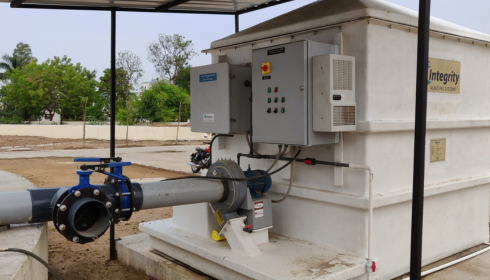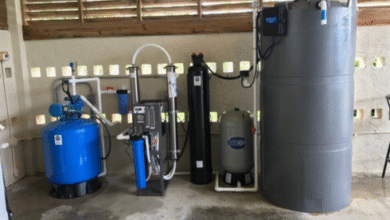Tired of That Rotten Egg Smell? Here’s How South Lyon Homeowners Are Treating Smelly Well Water for Good

Let’s face it—nothing disrupts the comfort of home quite like bad-smelling water. You turn on the tap, step into the shower, or start a load of laundry… and there it is: that unmistakable whiff of rotten eggs. Not exactly how you want to start your morning, right?
If you live in South Lyon, MI, and your home runs on well water, this scenario might sound all too familiar. But here’s the thing—you’re not stuck with it. That smell? It has a cause. And the good news? It also has a solution.
Let’s break down what’s really going on, and how you can treat smelly water in South Lyon MI with real, lasting fixes—not temporary cover-ups.
Why Does My Water Smell So Bad?
The smell you’re dealing with likely comes from hydrogen sulfide gas (H₂S), a naturally occurring compound that smells like sulfur or rotten eggs. It forms when certain bacteria feed on sulfur compounds in groundwater. These sulfur bacteria thrive in low-oxygen environments like wells.
When H₂S enters your plumbing system, it can come out of the faucet as a gas, producing that strong, unpleasant odor. Sometimes it’s stronger when the hot water runs—your water heater may be encouraging the chemical reaction by way of its magnesium anode rod.
And while hydrogen sulfide isn’t typically dangerous at low levels, it’s still a major nuisance. It can also corrode metal components in your plumbing system, stain your laundry and fixtures, and give your water an unpleasant taste.
South Lyon’s Water and the Sulfur Struggle
South Lyon’s groundwater is mineral-rich—great for natural resources, not so great for homeowners with wells. Many properties throughout the area deal with issues related to iron, manganese, and yes, sulfur. It’s especially common in deeper wells and older well systems.
What makes it more frustrating is that the smell can come and go, sometimes fading for weeks and then returning stronger than ever. That’s because sulfur bacteria are stubborn. They multiply quickly and can recolonize water systems if they’re not properly treated.
What Not to Do
It’s tempting to throw a short-term fix at the problem. Pouring bleach into your well, using a faucet filter, or switching detergents might help—for a minute. But the sulfur smell almost always comes back. Why? Because you’re treating the symptom, not the source.
Covering up the odor doesn’t solve the underlying chemical reaction. And over time, it can lead to wasted money, frustration, and even damage to your plumbing or water heater.
Real Solutions That Actually Work
When it comes to odor control for well water, what you really need is a system that prevents hydrogen sulfide from forming—or removes it before it reaches your tap.
Here are a few effective, long-term odor solutions South Lyon homeowners are turning to:
1. Air Injection Oxidation Systems (AIO)
These systems inject air into the water line, which oxidizes the hydrogen sulfide gas into solid particles that are then filtered out. They’re low-maintenance and highly effective for homes with moderate sulfur issues.
2. Ozone or Chlorine Injection Systems
For severe odor problems or multiple contaminants (like iron or manganese), these systems disinfect and oxidize the water. Chlorine kills bacteria, while ozone is a chemical-free oxidizer. Both are followed by filtration to remove solids and residual chemicals.
3. Catalytic Carbon Filters
These filters are great for homes with lighter sulfur content. They use high-grade carbon media to absorb odors and improve overall taste. Often used in combination with other treatments.
4. Hot Water Heater Adjustments
If your odor is only present in hot water, replacing your magnesium anode rod with an aluminum or zinc rod may solve the issue entirely. A plumber can handle this easily.
Why You Should Work with a Local Expert
Not all water treatment systems are built the same—and not every home has the same water chemistry. That’s why working with a local water specialist is crucial. They’ll run a detailed water analysis, understand South Lyon’s common groundwater problems, and recommend the right system for your specific needs.
They’ll also make sure your system is correctly installed and maintained—because no one wants to invest in odor control only to deal with the smell again in six months.
Here’s your helpful keyword use: If you’ve been struggling to treat smelly water South Lyon MI, odor control for well water, odor solutions offered by local water experts can finally give you the fresh, clean water your home—and your family—deserves.
What to Expect After Installation
The change is immediate. And it’s more than just the absence of a bad smell.
- Water tastes better
- Showers feel fresher
- Laundry comes out cleaner and odor-free
- Fixtures stop collecting black or yellow stains
- Guests stop asking, “Is there something wrong with your water?”
It’s a small improvement with a big ripple effect on everyday life.
Final Thoughts: You Don’t Have to Settle
Bad-smelling water doesn’t mean you’re stuck with bad water. And you don’t have to keep holding your breath every time you turn on the tap. Whether your sulfur smell is mild or overwhelming, there are real solutions that target the cause—not just the odor.
It starts with testing. Then the right system. And before you know it, you’ll wonder how you ever lived with that smell in the first place.
Fresh, clean water isn’t a luxury—it’s the standard you deserve.




